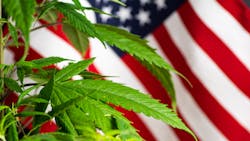In a landmark study published earlier this week in the medical journal Health Affairs, researchers at the University of Georgia found that the use of prescription drugs is significantly less in states where medical marijuana has been legalized. The drop in prescription medication use was especially pronounced for patients with chronic pain, a condition often treated with opioids.
The study has garnered national media coverage, and it’s the strongest evidence yet that medical marijuana does not fuel the nation’s opioid crisis. Rather, it seems to be a significant tool in America’s fight against the overuse of opioids.
“Generally, we found that when a medical marijuana law went into effect,” the study’s authors concluded, “prescribing for FDA-approved prescriptions drugs under Medicare Part D fell substantially.”
Significantly, prescriptions for chronic pain showed the greatest drop. On average, physicians in medical marijuana states wrote 1,826 fewer daily-dose prescriptions for painkillers annually compared to physicians in non-MMJ states.
This chart, published as part of the Health Affairs study, records the difference in annual prescriptions, per physician, for specific ailments. In legal medical marijuana states, for instance, an average of 562 fewer daily doses of prescription drugs were filled for patients with anxiety, compared to patients in non-MMJ states.

The study comes at a critical moment in the debate over opioid use, medical cannabis, and legalization. A number of prohibitionists and public officials — most notably in the Northeast — have attempted to tie America’s ongoing opioid crisis to the legalization of medical and adult-use cannabis. “The shadow of the heroin epidemic is something that people think about when they think about the legalization [of cannabis],” Vermont House Speaker Shap Smith said earlier this year, just before a promising legalization measure stalled in the state Capitol. Some elected officials in Massachusetts have also pointed to the region’s out-of-control opioid crisis as a reason to oppose the state’s legalization measure, which will go before voters in November.
The effect of legal medical cannabis on the overuse of prescription meds may actually be greater than indicated by this one study. Ashley C. Bradford and W. David Bradford, the University of Georgia scientists who co-authored the work, relied upon data from patients enrolled in the government’s Medicare Part D prescription drug plan. That plan is available only to people 65 or older.
In other words, the study is essentially a look at the effect of MMJ laws on retirees — a demographic group that has been shown to be among the most hesitant to try medical cannabis. A similar study on a younger, more cannabis-comfortable demographic group, could well reveal an even greater drop-off in prescription drug use.








